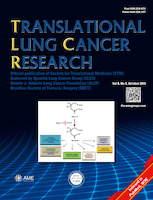
Translational Lung Cancer Research
Scope & Guideline
Elevating the standards of translational oncology research.
Introduction
Aims and Scopes
- Clinical Research and Trials:
The journal publishes studies related to clinical trials assessing the efficacy and safety of various treatments for lung cancer, including chemotherapy, immunotherapy, and targeted therapies. - Biomarkers and Genomics:
Research on the identification and validation of biomarkers for early detection, prognostication, and treatment response in lung cancer, emphasizing genomic alterations and their implications. - Radiology and Imaging:
Papers that explore advancements in imaging techniques, including CT, PET, and radiomics, to enhance diagnostic accuracy and guide treatment decisions. - Patient-Centered Care:
Studies focusing on the quality of life, psychological impact, and socioeconomic factors affecting lung cancer patients, including screening programs and survivorship. - Innovative Therapeutic Approaches:
Research on novel therapies and combinatorial approaches, including immunotherapy and personalized medicine, aimed at overcoming resistance and improving patient outcomes. - Surgical Techniques and Outcomes:
Publications detailing advancements in surgical procedures, including minimally invasive techniques, their efficacy, and associated outcomes. - Epidemiology and Risk Factors:
Research addressing the epidemiological aspects of lung cancer, including risk factors, demographics, and trends in incidence and mortality.
Trending and Emerging
- Immunotherapy and Combination Therapies:
There is a significant increase in research focusing on immunotherapy, particularly combination therapies that integrate immune checkpoint inhibitors with other treatments to enhance efficacy. - Liquid Biopsy and Circulating Biomarkers:
Studies on liquid biopsy techniques and circulating tumor DNA (ctDNA) are gaining momentum, offering non-invasive methods for monitoring treatment responses and disease progression. - Artificial Intelligence in Diagnostics:
The integration of AI and machine learning in the analysis of imaging and genomic data is emerging as a powerful tool for improving diagnostic accuracy and personalizing treatment plans. - Real-World Evidence Studies:
An increasing number of publications are focusing on real-world data to evaluate treatment effectiveness and patient outcomes outside of controlled clinical trial settings. - Health Disparities and Access to Care:
Research addressing health disparities in lung cancer screening and treatment access is gaining traction, highlighting the need for equitable healthcare solutions. - Microbiome Research:
Exploration of the role of the microbiome in lung cancer development and treatment response is emerging as a novel area of investigation, linking systemic health with cancer outcomes.
Declining or Waning
- Traditional Chemotherapy Studies:
As targeted therapies and immunotherapy gain prominence, traditional chemotherapy studies are becoming less frequent, indicating a shift towards more innovative treatment modalities. - Basic Science and Preclinical Studies:
There is a noticeable reduction in purely basic science studies that do not directly translate to clinical applications, as the journal increasingly prioritizes translational research. - General Epidemiological Surveys:
Research focusing on broad epidemiological surveys without specific interventions or novel insights is declining, as more targeted and actionable studies are favored. - Non-Clinical Patient Experience Studies:
Papers focusing on non-clinical aspects of patient experience, such as general quality of life without specific cancer-related interventions, are diminishing in frequency.
Similar Journals
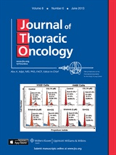
Journal of Thoracic Oncology
Empowering Innovation in Thoracic OncologyJournal of Thoracic Oncology, published by Elsevier Science Inc, is a premier scholarly outlet dedicated to advancing the field of thoracic oncology. With an impressive impact factor and consistently rated in the Q1 quartile across several pertinent categories such as Medicine, Oncology, and Pulmonary and Respiratory Medicine, this journal stands at the forefront of research dissemination. Covering a broad scope that includes innovative therapeutic approaches, clinical trials, and the molecular underpinnings of thoracic malignancies, the journal serves as a vital resource for researchers, healthcare professionals, and students seeking to enhance their understanding of thoracic cancer and its treatment. With publication dates converging from 2006 to 2024, the Journal of Thoracic Oncology fosters a collaborative scholarly community by providing a platform for high-quality research while ensuring accessibility through traditional publication formats. Positioned in the heart of New York City, this journal not only reflects the cutting-edge advancements in oncology but also plays a pivotal role in shaping the future of thoracic cancer care.

Bladder Cancer
Elevating the standard of care through impactful research.Bladder Cancer, published by IOS PRESS, is a premier open access journal dedicated to advancing the field of oncology and urology, with a specific focus on bladder cancer research and treatment. Established in 2015 and continuing through to 2024, this journal aims to disseminate high-quality, peer-reviewed research that contributes to the understanding, diagnosis, and management of bladder cancer, a critical area of concern in urological oncology. With a robust publication record now encompassing open access since 2023, Bladder Cancer ensures accessibility to vital research for clinicians, researchers, and scholars worldwide. The journal's rankings in Scopus reflect its commitment to excellence, holding a Q3 category in both oncology and urology, with Scopus ranks of #78 in Urology and #285 in Oncology, showcasing its growing influence in the scientific community. By fostering dialogue and innovation, Bladder Cancer serves as an essential resource for those committed to improving patient outcomes in bladder oncology.

BRITISH JOURNAL OF CANCER
Shaping the Future of Oncology Through Quality Scholarship.The British Journal of Cancer, published by SpringerNature, stands as a preeminent resource in the fields of Cancer Research and Oncology, with a distinguished history of publication dating back to 1947. With its Q1 rank in both categories for 2023, this journal is among the top-tier publications, offering cutting-edge research and insights into the biology, etiology, and treatment of cancer. The journal’s rigorous peer-review process ensures that readers are presented with high-quality studies that contribute to the advancement of cancer knowledge and clinical practice. Operating from the United Kingdom, it has garnered a notable impact factor and ranks impressively within Scopus, making it an essential publication for researchers, healthcare professionals, and students who are dedicated to understanding cancer's complexities. Access to the journal's articles is available in traditional formats, providing a versatile platform for disseminating pivotal research. As we move towards a future where cancer treatment and prevention remain crucial, the British Journal of Cancer continues to play a vital role in shaping the dialogue and discoveries within the oncology community.
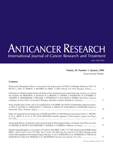
ANTICANCER RESEARCH
Pioneering Research for a Cancer-Free FutureANTICANCER RESEARCH, published by the International Institute of Anticancer Research, stands at the forefront of cancer-related scholarly communication. With ISSN 0250-7005 and E-ISSN 1791-7530, this esteemed journal has been serving the global research community since 1981, showcasing innovative research aimed at combating cancer through various therapeutic approaches and scientific inquiry. Based in Greece, the journal aims to disseminate vital findings in the fields of Cancer Research, Medicine, and Oncology, reflecting its notable categorization in the Q3 and Q2 quartiles as of 2023. Despite its rigorous peer-review process and the absence of open access, ANTICANCER RESEARCH remains a vital publication for researchers, clinicians, and students eager to stay updated on the evolving landscape of anticancer strategies. As it converges to its milestone year of 2024, the journal continues to enrich the discourse around cancer treatment and prevention, affirming its position as an essential resource for those dedicated to advancing knowledge in anticancer therapies.
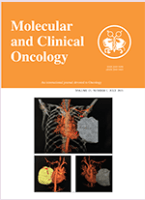
Molecular and Clinical Oncology
Innovating cancer care through rigorous research.Molecular and Clinical Oncology is a dynamic journal published by SPANDIDOS PUBL LTD, aimed at advancing the understanding of cancer biology and treatment modalities. With an ISSN of 2049-9450 and an E-ISSN of 2049-9469, the journal serves as a critical platform for researchers and clinicians dedicated to uncovering novel insights in molecular oncology and enhancing clinical practices. As a testament to its growing influence, the journal has achieved a Q3 ranking in Oncology and a Q4 ranking in Cancer Research for the year 2023, reflecting its commitment to publishing high-quality research. Although currently not an Open Access publication, the journal offers crucial subscription options, ensuring comprehensive access to groundbreaking studies and innovations in the field. With converged years spanning 2018 to 2024, the journal is set to continue enriching the academic community with its valuable contributions, ultimately empowering researchers, professionals, and students engaged in the fight against cancer.
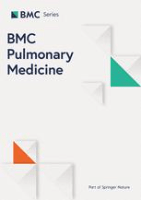
BMC Pulmonary Medicine
Championing unrestricted access to vital pulmonary research.BMC Pulmonary Medicine is a leading open access journal dedicated to the field of pulmonary and respiratory medicine, published by BMC since its inception in 2001. With an ISSN of 1471-2466, this journal plays a pivotal role in advancing knowledge and research dissemination in its field, maintaining a prominent position with a 2023 Scopus ranking of #65 out of 155 journals, placing it within the 58th percentile of the category. Based in the United Kingdom, it operates under a collaborative mission to provide unrestricted access to vital research, contributing to the global understanding of respiratory health issues. The journal is recognized for its commitment to high-quality, peer-reviewed research, as evidenced by its Q2 category designation in Pulmonary and Respiratory Medicine. BMC Pulmonary Medicine aims to foster innovation and scholarship among researchers, professionals, and students, making it an indispensable resource for anyone engaged in pulmonary research and practice. The journal, accessible to everyone, enables the dissemination of impactful research that can influence clinical practice and policy worldwide.

Translational Oncology
Transforming Cancer Insights into Clinical SolutionsTranslational Oncology is a premier open access journal published by Elsevier Science Inc, dedicated to the rapidly evolving field of cancer research and oncology. Since its inception in 2008, the journal has been a vital platform for the dissemination of innovative research and findings that bridge the gap between laboratory discoveries and clinical applications. With an impressive impact factor and ranked Q2 in Cancer Research and Q1 in Oncology, it occupies a prominent position in the academic landscape, helping to shape the future of cancer therapeutics and patient care. The journal offers valuable insights across a diverse array of topics, including molecular biology, genetic factors in cancer, and innovative treatment strategies, ensuring relevance and engagement for its readership. As it converges toward 2024, Translational Oncology continues to attract a global audience of researchers, healthcare professionals, and students committed to advancing our understanding of cancer and enhancing clinical outcomes.

South Asian Journal of Cancer
Advancing cancer research in South Asia.South Asian Journal of Cancer, published by GEORG THIEME VERLAG KG, is a pivotal platform for research in the fields of oncology and cancer research. Established in 2012 and operating under an Open Access model, this journal aims to disseminate high-quality, peer-reviewed articles that address crucial developments in cancer treatment, prevention, and research, particularly within the South Asian context. Despite its young history, the journal has been positioned within the Q4 quartile for both Cancer Research and Oncology, and while current Scopus rankings indicate it resides in the lower percentiles, its commitment to amplifying regional voices and research is invaluable. With its headquarters in Stuttgart, Germany, and a global readership, South Asian Journal of Cancer is dedicated to enhancing collaboration among researchers, healthcare professionals, and students, fostering a space for innovative ideas and advancements in cancer care as we progress through to 2024.
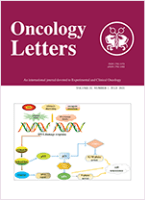
Oncology Letters
Connecting Researchers to Revolutionize Cancer CareOncology Letters is a prominent academic journal dedicated to disseminating high-quality research in the fields of oncology and cancer research. Published by SPANDIDOS PUBL LTD and based in Greece, this journal has established a significant presence since its inception in 2010 and continues to contribute to the scientific community with a focus on both clinical and experimental oncology. Notably, it holds a respectable Q3 ranking in the categories of Cancer Research and Oncology as of 2023, highlighting its relevance and contribution to these critical fields. With a Scopus rank of #139/404 in Medicine – Oncology and #117/230 in Biochemistry, Genetics, and Molecular Biology – Cancer Research, Oncology Letters serves as a valuable platform for researchers, professionals, and students alike to explore emerging findings and innovative treatment approaches. Though it operates within a traditional subscription model, this journal prides itself on fostering accessible and impactful discourse in oncology, making it an essential resource for those committed to advancing cancer research and improving patient care.
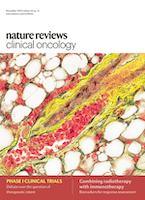
Nature Reviews Clinical Oncology
Pioneering Insights for Tomorrow's TreatmentsNature Reviews Clinical Oncology is a premier journal dedicated to the comprehensive exploration and critical evaluation of current advancements in the field of clinical oncology. Published by the esteemed NATURE PORTFOLIO in the United Kingdom, this influential journal boasts an impressive impact factor that reflects its significant role in shaping oncology research. As a Q1 ranked journal in Scopus, it occupies a notable position within the top tier of oncology publications, placing it in the 99th percentile among its peers. With a history of convergence from 2009 to 2024, it presents high-quality content through an open-access model, ensuring accessibility to vital research findings. Researchers, professionals, and students alike will find Nature Reviews Clinical Oncology an invaluable resource for staying abreast of the latest trends, biologic insights, and therapeutic innovations that drive the future of cancer treatment.